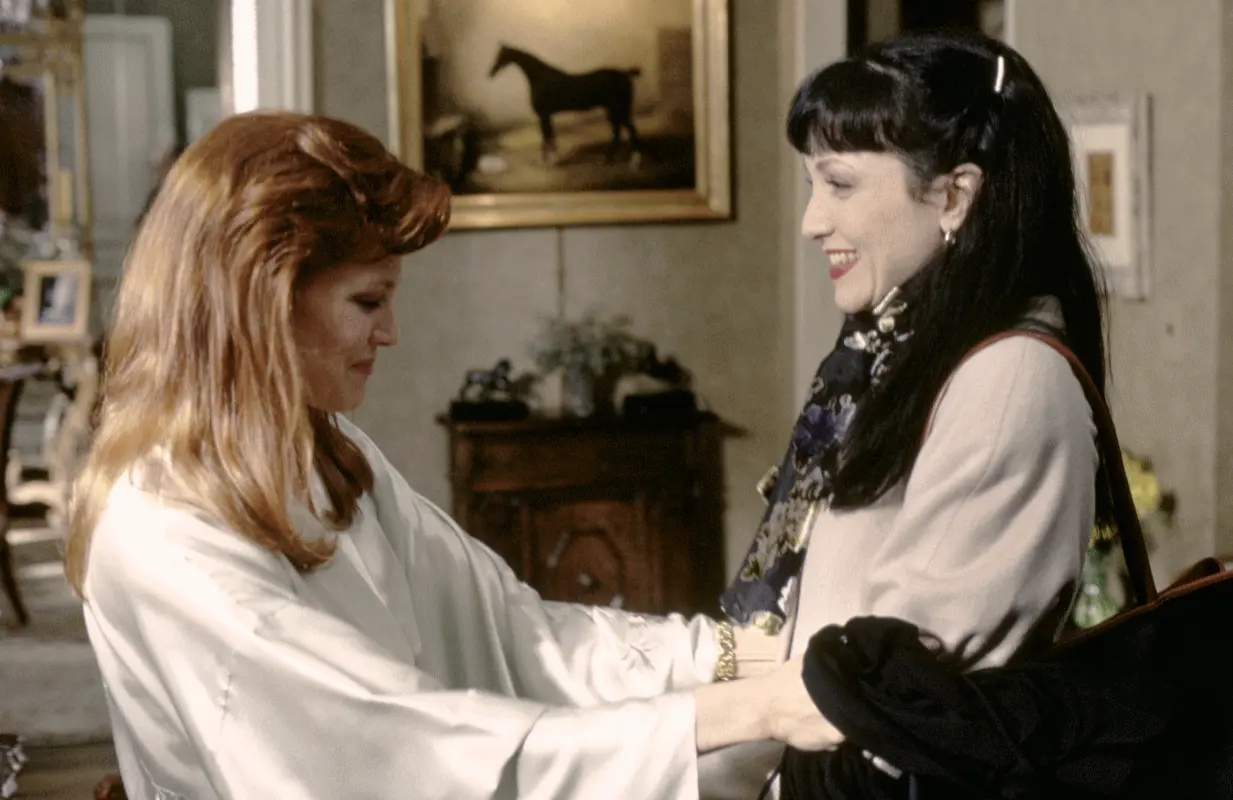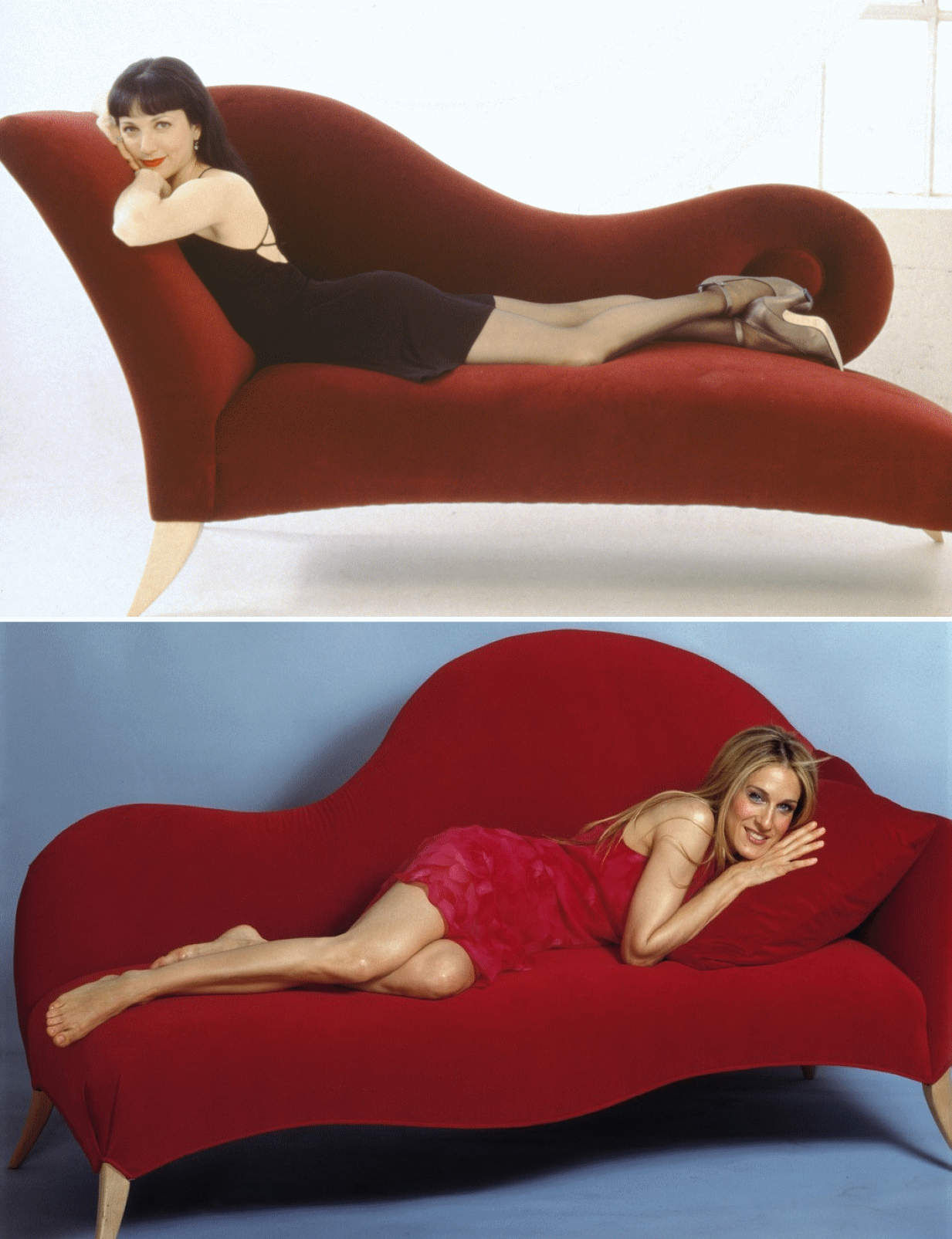Their Pilot Didn't Get Picked Up. It Won an Oscar Instead.
-
 Bebe Neuwirth (right) and Haviland Morris in a scene from Dear Diary. (ABC Photo Archives)
Bebe Neuwirth (right) and Haviland Morris in a scene from Dear Diary. (ABC Photo Archives)Quick: Can you name the first DreamWorks film to win an Academy Award? It wasn't Gladiator or Saving Private Ryan or Amistad. Before any of them were even released, the now-legendary studio got its first taste of Oscar gold with Dear Diary, a failed sitcom pilot that won Best Live Action Short at the 1997 ceremony.
That arguably makes Dear Diary the most successful failure in the history of TV, and you can imagine a network executive or two feeling sheepish as director David Frankel and producer Barry Jossen stepped to the podium to accept their award.
Seen today, Dear Diary is a prescient look at where cable channels were just about to take half-hour comedy. Filmed without a laugh track (which was almost unheard of for network sitcoms at the time), it follows one remarkable day in the life of a New York magazine art director named Annie (played by Bebe Neuwirth).
Through a series of coincidences, she manages to get fired, see a friend shoplifting at Barney's, meet that friend's husband, and then use the husband's off-hand comments as the impetus to get her job back. The writing is clever and elegant, tying up the story like something by O. Henry, and the style is "MTV chic," with smash cuts pulling us between the present moment and the things Annie is remembering from earlier in the day.
Throughout, we hear voiceover narration as Annie records the day in her diary. If you change that diary to a newspaper column, and you throw in a few R-rated jokes, then this show basically becomes a prototype of Sex and the City, which premiered on HBO less than eighteen months after Dear Diary won the Oscar. In fact, both Frankel and Jossen worked on that series. (Famed Sex and the City costume designer Patricia Field also worked on Dear Diary, as did longtime SATC editor Michael Berenbaum.)

The people who made the show believed in it from the start, even if they knew it was unlike most other network comedies of the era. Speaking to Primetimer, Jossen recalls the day that he and Frankel first saw the pilot: "No one says a word the whole time. We sit back and watch it. And within moments after it ended, David turns to the room and says, 'Wow, that may not work as a TV pilot, but that is a really good short film.'"
Frankel's comment led Jossen, who was the head of production for the newly formed DreamWorks Television (the division of DreamWorks that financed Dear Diary). to hatch up a contingency plan in the event the project didn't get picked up to series: he'd submit it to festivals as a short film. However, after ABC officially passed on the show, he realized he had missed the application deadline for most of that year's festivals. He was prepared to wait a year, until fate intervened.
"Marvin Levy calls me," Jossen says. (Levy had come to DreamWorks after decades as a prominent film marketer and publicist, including for Spielberg's Amblin Entertainment.) "Marvin calls me and says, 'Hey, what's going on with Dear Diary?' I said, 'Nothing, basically.' He said, 'Have you considered submitting it for Oscar consideration?' I said, 'Well, no.' He says, 'Well, I'll tell you what: I'm gonna fax over the rules and the application. Take a look and see if you can figure out how to make it eligible for Oscar consideration.'"
When he saw the rules, Jossen realized that if Dear Diary played in a Los Angeles movie theatre for at least five days, it would qualify for Academy consideration that year. That set the DreamWorks team in motion, and they got the movie onto a single screen, where it ran for a few days before select screenings of Shine, a major player in that year's Oscar race. From there, the pieces kept falling into place until Jossen and Frankel found themselves at the podium, accepting their award.
No one will ever take this path to the Oscars again. Shortly after that year's ceremony, the Academy changed their rules to explicitly state that TV pilots are ineligibile. "I call that the Dear Diary rule," Jossen says.
Yet despite being the inspiration for an Academy ban, he's certainly flourished. In his long career as a television executive at companies including ABC and A+E Studios, he's developed and produced shows like Lost, Grey's Anatomy, Cougartown, UnREAL, You, and Netflix's recently released The Lincoln Lawyer. Frankel, meanwhile, won an Emmy for directing Band of Brothers, and he's directed high-profile movies (The Devil Wears Prada) and TV series (The Morning Show). His latest film, Jerry and Marge Go Large — about small-town lottery winners played by Bryan Cranston and Annette Bening — premieres this Friday, June 17 on Paramount+.
All in all, that gives Dear Diary a better legacy than plenty of shows that actually got picked up. Sometimes being a failure is the best thing a show can hope for.
Dear Diary ultimately aired on the short-lived cable channel Trio, where it was recorded and later uploaded to YouTube. You can watch it in its entirety below:
Mark Blankenship has been writing about arts and culture for twenty years, with bylines in The New York Times, Variety, Vulture, Fortune, and many others. You can hear him on the pop music podcast Mark and Sarah Talk About Songs.
TOPICS: Oscars, Dear Diary, Sex and the City, Barry Jossen, Bebe Neuwirth, David Frankel
- Why are the Oscars moving to YouTube? Academy announces major streaming shift
- 2026 Oscar Shortlists: Complete list of nominations announced in 12 award categories so far
- Charlie Sheen recalls Emilio Estevez's "You sitting" talk before losing the Oscar-nominated role to Tom Cruise
- Is YouTube looking to host the Oscars? Here is everything to know